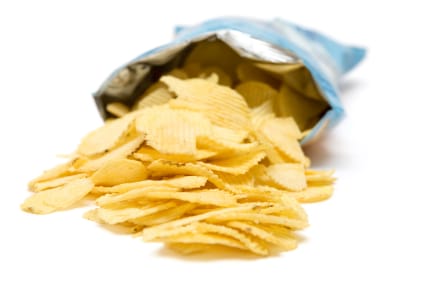
The Reason You Crave Carbohydrates
Carbohydrates have two important functions in the body. They’re a fuel source, especially during high-intensity exercise. You call upon them every time you sprint across a field or lift a heavy weight.
Carbohydrates also play an important role in synthesizing serotonin, a natural brain chemical that regulates mood. People with low serotonin levels feel more sluggish. When serotonin levels drop very low it can lead to symptoms of sadness and depression. When you eat carbohydrates, insulin is released. This surge in insulin helps to ferry tryptophan, a precursor to serotonin, into the brain where it can be used to make more mood-boosting serotonin.
As you can see, eating carbohydrates and the insulin surge that comes afterward is rewarding to the brain. When you chomp down on cakes, cookies and bread, you produce more serotonin. This boosts your mood, and when something makes you feel good, you want to repeat it. This is probably why humans crave high-carb comfort foods like macaroni and cheese and mom’s mashed potatoes and gravy during times of stress. Eating carbs can be a form of self-medication when you’re feeling down.
Are There Ways to Control Carbohydrate Cravings?
Anything that increases serotonin levels in the brain helps to reduce carbohydrate cravings. Research shows that aerobic exercise boosts brain tryptophan levels, which helps the brain produce more serotonin. This may be why exercise has a mood-boosting effect and helps to ease depression.
Serotonin levels drop in the winter because of reduced exposure to sunlight. Many people find their cravings for carbohydrates are greatest during the winter months when they aren’t outdoors in the sun. Some people are prone to a condition called seasonal affective disorder where they become depressed during the winter months due to low serotonin levels from lack of sunlight.
Carbohydrate cravings are common among people with seasonal affective disorder. The standard treatment for seasonal affective disorder is phototherapy using a full-spectrum light box to mimic the effects of the sun. Can sitting under a lightbox curb carbohydrate cravings in people without seasonal affective disorder? There hasn’t been much research on this, but it makes sense.
Other Ways to Eliminate Carb Cravings
Not all carbs are bad. The key is to replace bad carbs with healthier ones like those in fruits, vegetables, and whole grain foods. Once eliminating bad carbs, most people stop craving them after 3 to 4 weeks, but it can be challenging to reach that point if you’re carb addicted. Here are some steps to take to overcome cravings for carbs.
Clean out your cabinets and refrigerator, and throw out the unhealthy carbs that tempt you. This includes cookies, cakes, pastries, crackers, chips and other sources of empty calories. Pitch the white bread and replace it with whole-grain. Substitute bad carb foods with fiber-rich fruits such as berries to satisfy your craving for something sweet. When you eat carbohydrates, eat them along with a source of lean protein to keep your blood sugars stable. When blood sugar levels drop, carb cravings increase.
Eliminate caffeine. Caffeine increases cortisol levels, which can trigger carbohydrate cravings
Don’t skip meals. When your blood sugar and energy levels drop from lack of food, it makes cravings for carbohydrates worse. Eat 5 small meals a day consisting of a healthy carb and a lean protein source.
Finally, boost your serotonin levels with regular aerobic exercise. Spend more time outdoors where you’re exposed to natural sunlight. This not only increases serotonin levels but boosts vitamin D levels too. Many people have vitamin D levels that are too low, which can cause them to feel tired or depressed.
Get at least 7 hours of sleep a night. According to a study presented at the Sleep 2011 conference, carbohydrate cravings increased with daytime sleepiness among a group of high school seniors. Lack of sleep has been shown to worsen cravings for carbs and has been linked with weight gain.
Carbohydrate Cravings Can Be Conquered
A combination of regular exercise, sufficient sleep, and dietary changes can help keep those carbohydrate cravings at bay. Don’t let them keep you from achieving your weight loss goals.
References:
Journal of Psychiatry and Neuroscience. “How to Increase Serotonin in the Human Brain without Drugs”
Science Daily. “Daytime Sleepiness is Associated With an Increased Craving for Carbs Among Teens”
Related Articles By Cathe:
6 Tips for Keeping Carb Cravings in Check
5 Reasons You Feel Sleepy & Less Productive after a Meal & What You Can Do about It
Why Women Crave Sugary Foods More Than Men
Can Eating a Nutrient Rich Diet Reduce Hunger?
The Important Role Macronutrients Play in Controlling Hunger

